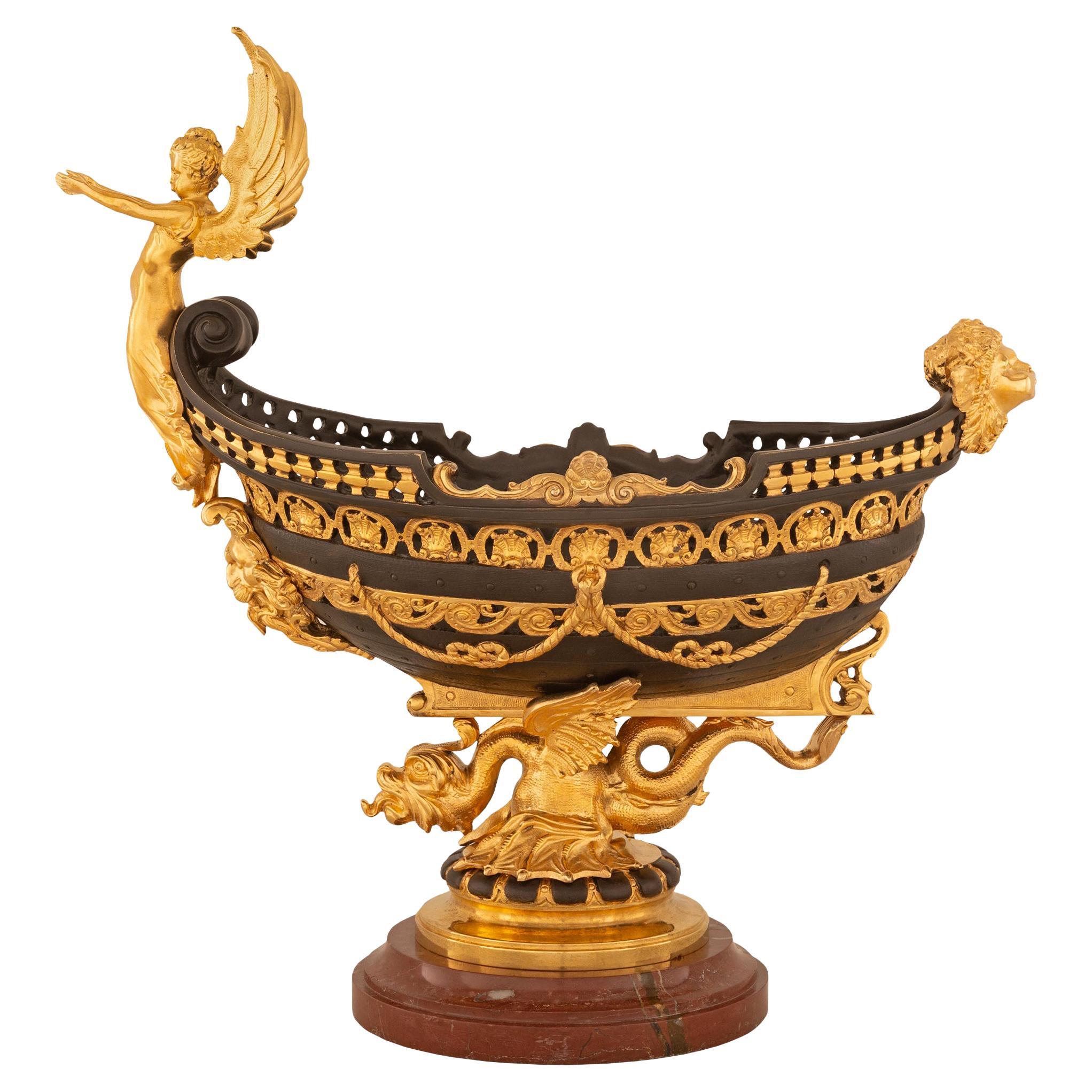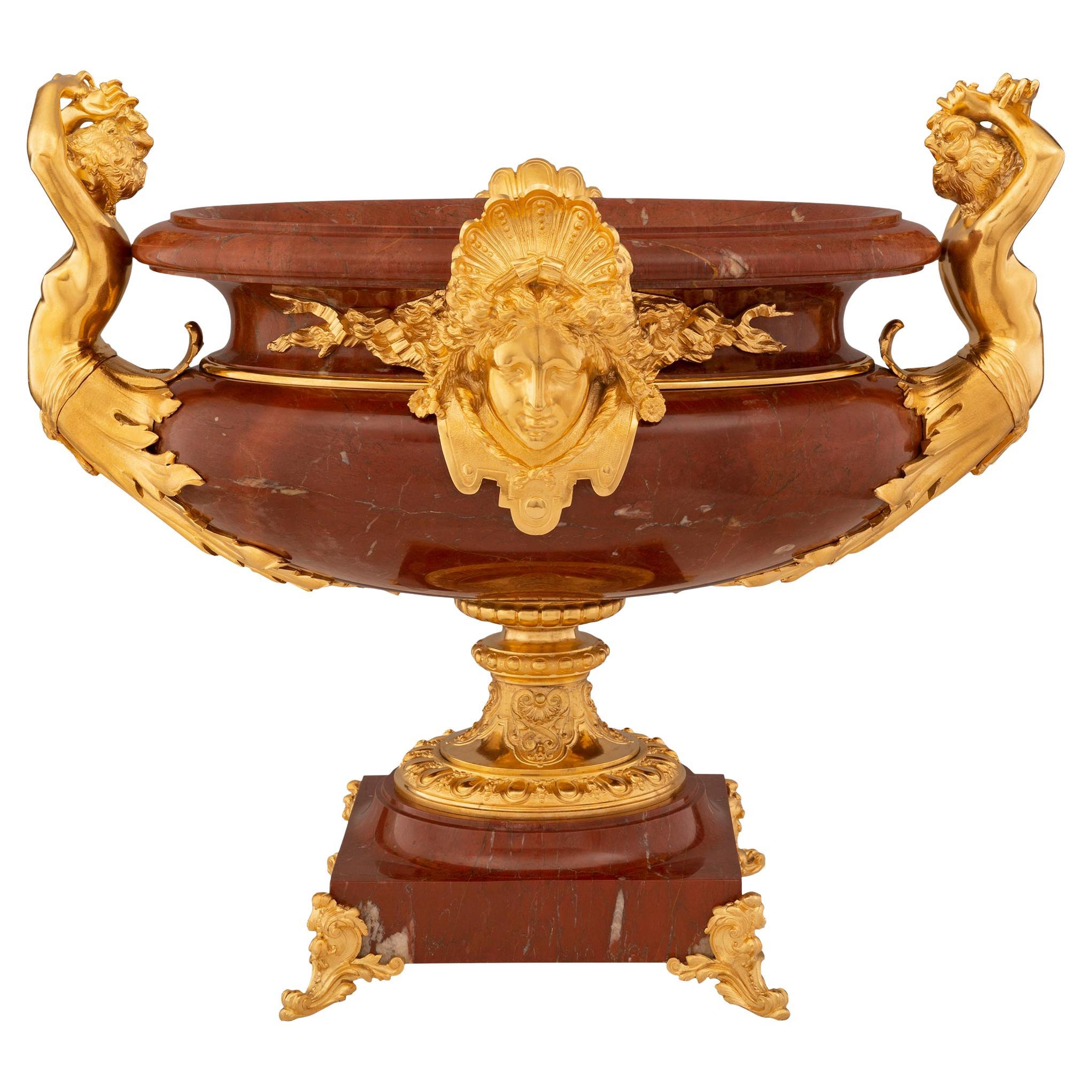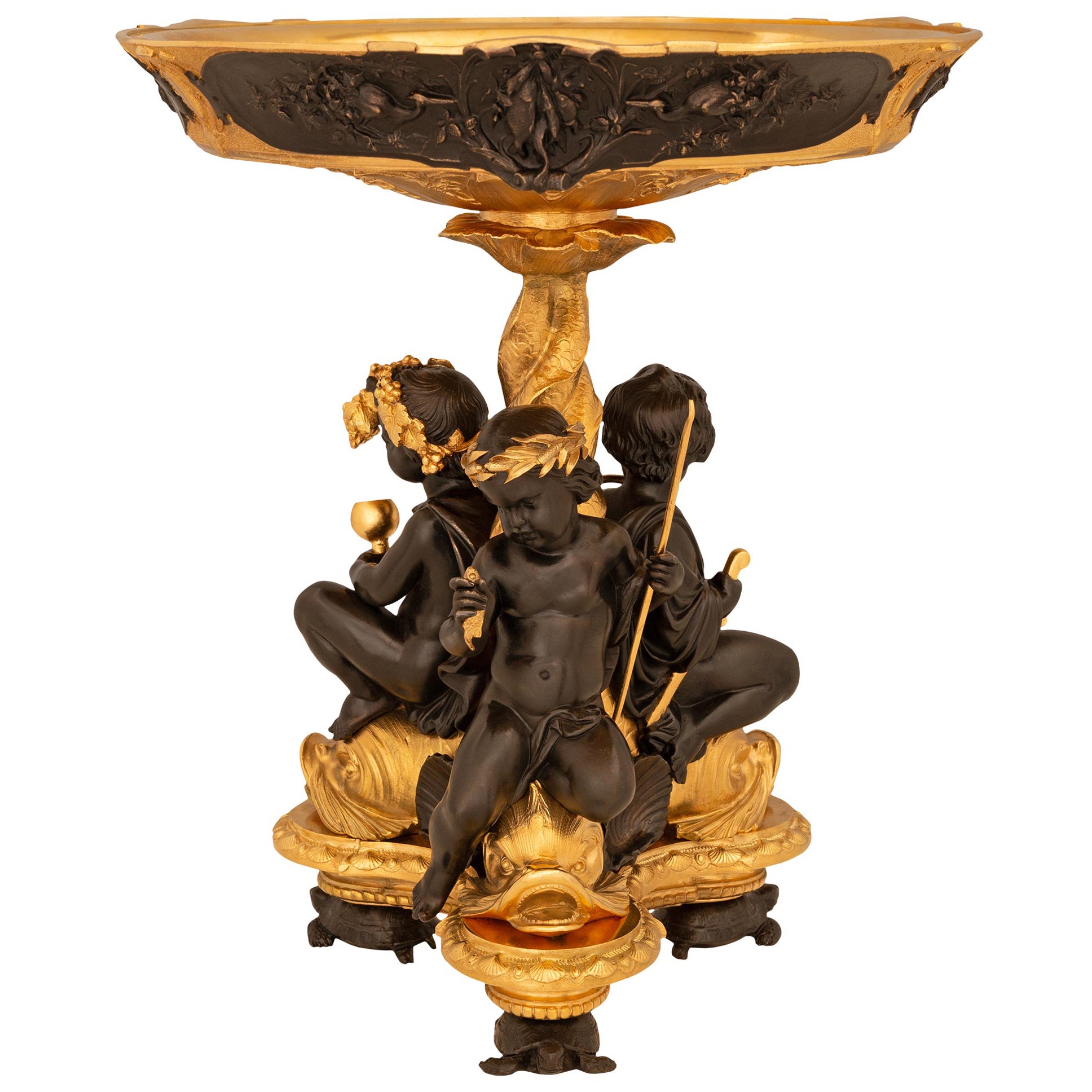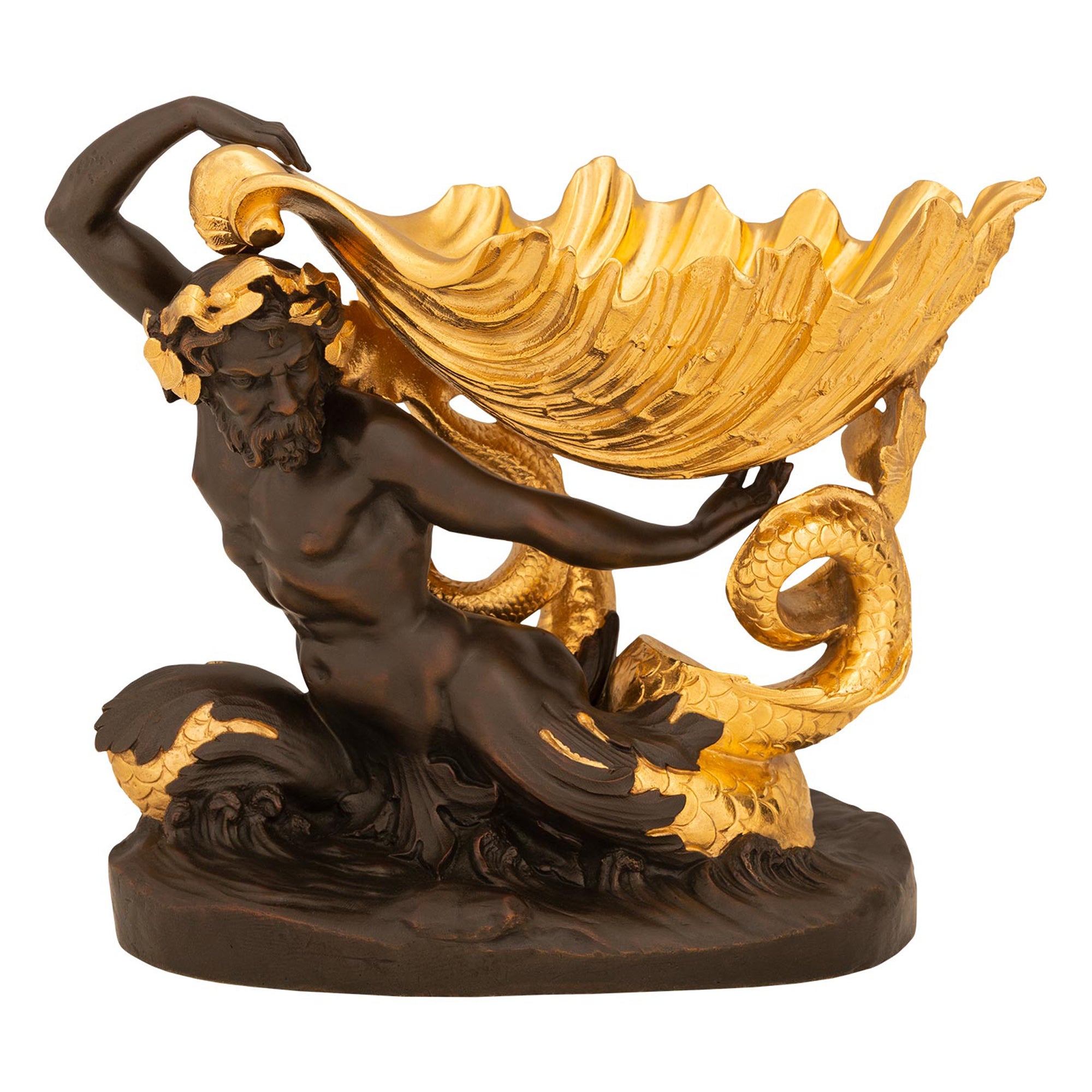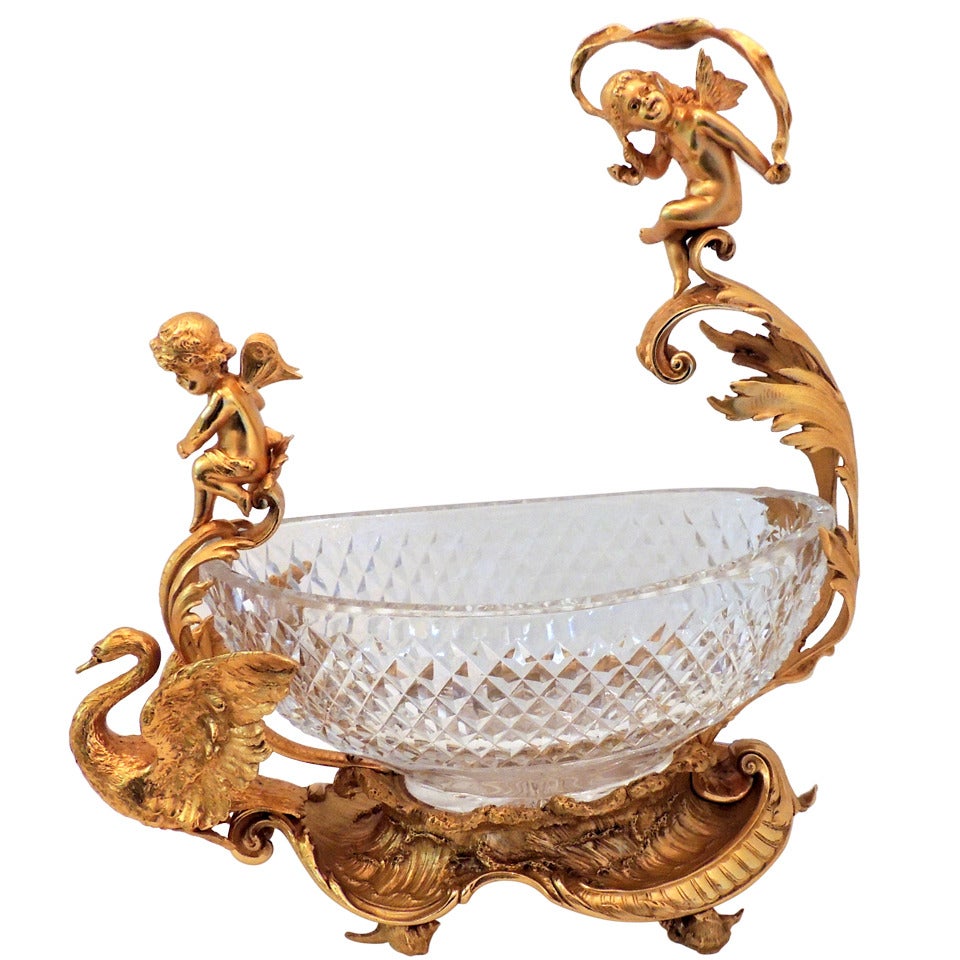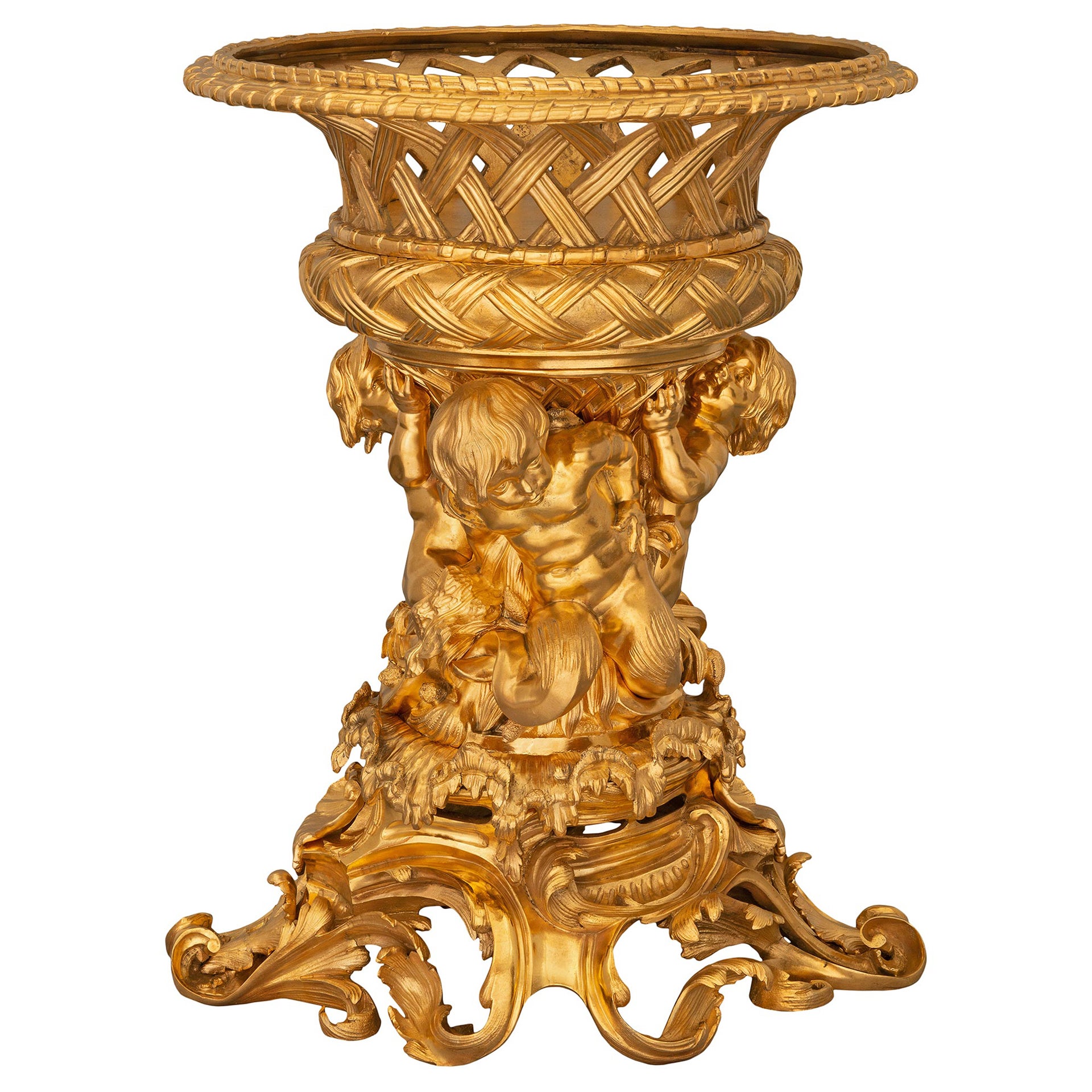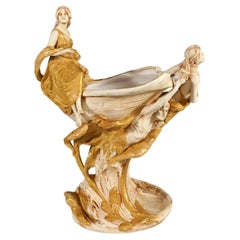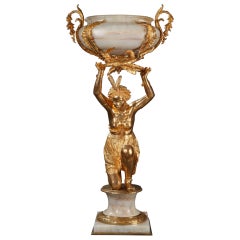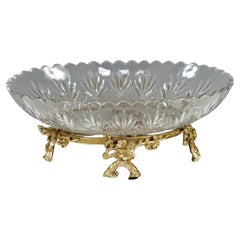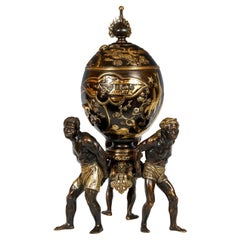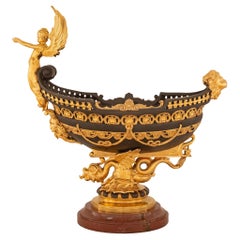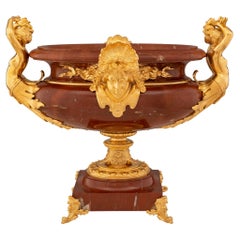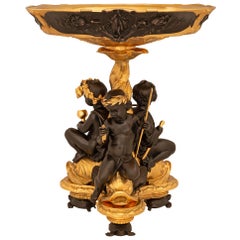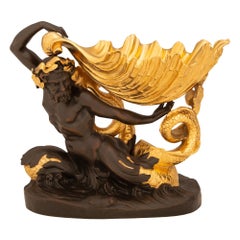Items Similar to Centerpiece "The Naiad", attributed to G. Denière, France, circa 1870
Want more images or videos?
Request additional images or videos from the seller
1 of 10
Centerpiece "The Naiad", attributed to G. Denière, France, circa 1870
$45,293.02
£33,537.99
€38,000
CA$62,284.70
A$69,266.62
CHF 36,257.88
MX$844,968.46
NOK 455,593.43
SEK 428,544.44
DKK 289,318.22
About the Item
Exceptional centerpiece in silvered and gilded bronze, composed of a naiad riding a dolphin, supporting a chiseled shell decorated with reeds, adorned with the head of a river god on its bow and on which a winged love blows in a conch. The whole rests on a pedestal decorated with dolphin heads and cut-out leathers, ending with a porphyry base with molded steps.
Historical and artistic context
Centers and naves of tables are attested in France from the Middle Ages in order to present spices and other condiments brought from distant lands around the Mediterranean or from the trade of the Silk Roads. The importance of their presence on prestigious tables will be confirmed throughout the decorative arts, evolving during the 19th century in centerpieces, becoming a central element of decoration.
Here we find a true virtuosity in the composition and representation of the human figure which is reminiscent of the greatest artists of the Italian Renaissance. Indeed, the fluidity of the lines of the naiad can be compared to the nymph of Fontainebleau by Benvenuto Cellini preserved at the Louvre museum and dated 1545, while the naturalist representation of the marine setting refers to the work of Wenzel Jamnitzer such as his writing desk decorated with naturalist shells kept at the Kunsthistorisches Museum in Wien.
This nave is an artistic manifesto of bronze-making know-how in France at the end of the 19th century and is most likely the work of the bronze-maker Denière, a student of Aimé Chenavard.
Related work
A close example concerning the female figure on a pair of naves from the mid-19th century is kept in a private collection (see photo attached)
Biography
Guillaume Denière (1815-1903) was the pupil of the famous ornementalist Aimé Chenavard (1798-1838) and of the architect Henri Labrouste (1801-1875). In 1844, Denière succeeded his father in the family workshop, established in 1804, at 15, rue Vivienne in Paris. The business was at this time prosperous and four hundred workers worked to satisfy the numerous commissions from King Louis-Philippe and the upper classes. He made bronze furnishings, candelabras and centrepieces. He collaborated with a number of artists, amongst whom Carrier-Belleuse (1848-1913) and Constant Sévin (1821-1888). He turned out several clocks for the Tuileries Palace in 1852, as well as a ‘globe’ clock with rotating dials for the Grand Salon of the Château of Bagatelle. Denière’s work was very often remarked upon at the Universal Exhibitions, so much so in fact that the Emporer Napoleon III bought, at the Paris Exhibition of 1867, a clock set. His renown was by this point international. Amongst his most prestigious commissions, Denière produced 1854 a spectacular bronze centrepiece for the Russian ambassador, Kisselef, and decorative bronzes for the Viceroy of Egypt, Saïd Pacha, as well as railings for the Throne Room for the King of Cambodia, Norodom I, in 1862. At the 1889 Universal Exhibition G. Denière won a gold medal.
- Attributed to:Guillaume Denière (Metalworker)
- Dimensions:Height: 26.78 in (68 cm)Width: 13.39 in (34 cm)Depth: 12.21 in (31 cm)
- Style:Renaissance Revival (Of the Period)
- Materials and Techniques:
- Place of Origin:
- Period:
- Date of Manufacture:circa 1870
- Condition:Wear consistent with age and use.
- Seller Location:PARIS, FR
- Reference Number:1stDibs: LU3860337911002
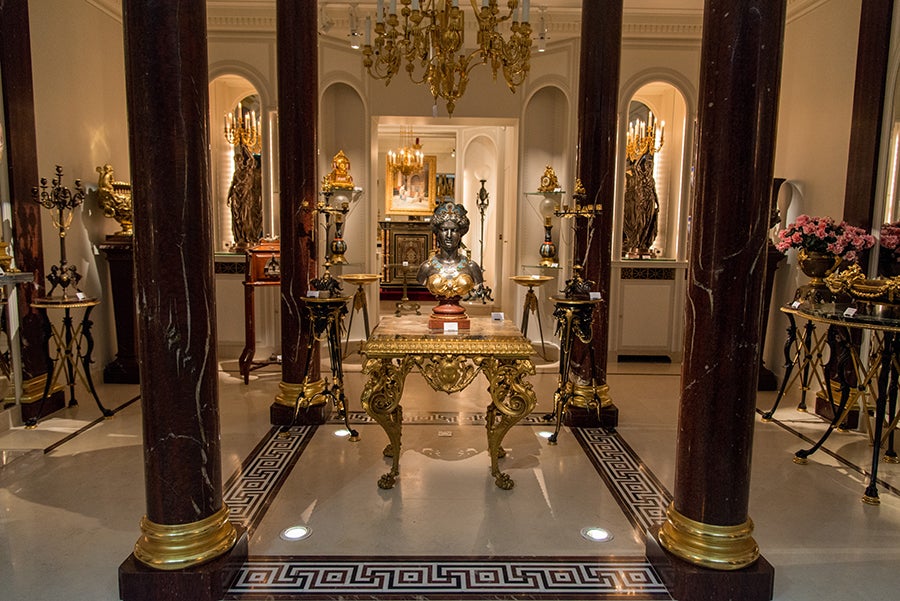
About the Seller
4.9
Vetted Professional Seller
Every seller passes strict standards for authenticity and reliability
Established in 1997
1stDibs seller since 2018
87 sales on 1stDibs
Typical response time: <1 hour
Associations
International Confederation of Art and Antique Dealers' Associations
- ShippingRetrieving quote...Shipping from: PARIS, France
- Return Policy
Authenticity Guarantee
In the unlikely event there’s an issue with an item’s authenticity, contact us within 1 year for a full refund. DetailsMoney-Back Guarantee
If your item is not as described, is damaged in transit, or does not arrive, contact us within 7 days for a full refund. Details24-Hour Cancellation
You have a 24-hour grace period in which to reconsider your purchase, with no questions asked.Vetted Professional Sellers
Our world-class sellers must adhere to strict standards for service and quality, maintaining the integrity of our listings.Price-Match Guarantee
If you find that a seller listed the same item for a lower price elsewhere, we’ll match it.Trusted Global Delivery
Our best-in-class carrier network provides specialized shipping options worldwide, including custom delivery.More From This Seller
View AllRoyal Dux Bohemia, Art Nouveau Centerpiece, Bohemia, circa 1900
By Royal Dux Bohemia
Located in PARIS, FR
Bearing the mark Royal Dux and numbered 1252
Large enamelled porcelain centerpiece with golden highlights, representing a nymph sitting on a shell like a ship sailing on the waves, ...
Category
Antique Early 1900s Czech Art Nouveau Decorative Bowls
Materials
Porcelain
Maison Marnyhac, "African Venus" , Planter France, Circa 1870
By Maison Marnyhac 1
Located in PARIS, FR
Exceptional planter by Maison Marnyhac in chiseled and gilded bronze and Algerian onyx representing a young African woman kneeling, carrying an oval bowl decorated with foliage. She is dressed with a loincloth, wearing an egret and adorned with many jewels. It rests on a square base decorated with gilded bronze.
A model of a similar African Venus...
Category
Antique 19th Century French Napoleon III Planters, Cachepots and Jardini...
Materials
Onyx, Bronze
Cut-Crystal Centerpiece attr. to Baccarat, France, circa 1880
By Cristalleries De Baccarat
Located in PARIS, FR
Elegant oval cut-crystal centerpiece decorated with stylized palmettes on a grid background, resting on a silver patina bronze mount representing blooming branches.
Biography :
The ...
Category
Antique 1880s French Japonisme Centerpieces
Materials
Crystal, Bronze
Covered Vase with Atlantes, attr. to A. Giroux, France, circa 1880
By Alphonse Giroux et Cie
Located in PARIS, FR
Beautiful ovoid-shaped covered vase in patinated bronze with golden highlights, with rich rotating decoration in relief. The lid, symbolizing Night, is decorated with a turtle, a moon, a dragon flying among the clouds ; and the belly, symbolizing the Day, is decorated with a rising sun, mountainous landscapes, and cherry tree branches.
The whole, topped with a flamed seed, is supported by three African-type atlantes dressed in a loincloth.
Historical and artistic context
This work of art combines elements of Japonism and Orientalism, two important movements representative of the taste of the time for exoticism. Indeed, this taste for Chinoiserie was revived at the end of the 19th century following the Franco-English military campaign against the imperial army in China in 1860. Napoleon III’s French troops bring back part of the treasure from the Summer Palace, constituting in 1863 the famous Chinese Museum of Empress Eugénie at the Palace of Fontainebleau. First in painting, the movement quickly spread to decorative arts and furniture.
This craze for the Far East is encouraged in France by the diffusion of Chinese ornamental works renewing the interior decoration of the luxurious Parisian residences of a clientele eager for something new.
It was also under the Second Empire that the Orientalists were propelled to the forefront. Emperor Napoleon III, aristocrats as well as wealthy bourgeois in search of exoticism fill the order books of the most renowned artists. It is then not the predominantly academic style of the Orientalists that counts but above all the exoticism that they show to a fascinated public.
Biography
Alphonse Giroux and Company, famous curiosity and luxury goods shop was situated in Paris, at No. 7 rue du Coq-Saint-Honoré and in business from the time of the Consulate until the end of the Second Empire. The company was founded by Francois-Simon-Alphonse and continued in 1838 by his two sons, Alphonse-Gustave (1810-1886) and André (1801-1879). The father became a close associate of the royal family and specialized in the manufacture of refined items for gifts. Kings Louis XVIII and then Charles X were both supplied with gifts for « The Children of France » by Giroux. Making progressively small furniture, they were mentionned for the first time in 1837 in the class « cabinet...
Category
Antique 1860s French Napoleon III Decorative Boxes
Materials
Bronze
The « Nymphs » Bowl by A-E Carrier-Belleuse and H. Journet & Cie, France, c 1878
By Albert-Ernest Carrier-Belleuse, H. Journet & Cie
Located in PARIS, FR
Signed Carrier et H Journet et Cie, 24 bd des Italiens, Sté des Onyx and numbered 2326
Diameter Base : 44 cm (17,3 in.) ; Diameter bowl : 49 cm (19,3 in)
Important and rare circular...
Category
Antique 1870s French Decorative Bowls
Materials
Onyx, Bronze
Neo-Greek Silvered Bronze Bowl Attributed to G. Servant, France, circa 1880
By Georges Emile Henri Servant
Located in PARIS, FR
Beautiful silvered bronze neo-Greek style bowl in a circular shape, adorned on the body with female masks in the antique style and on the sides with handles in the shape of busts of ...
Category
Antique 1880s French Greek Revival Decorative Bowls
Materials
Griotte Marble, Bronze
You May Also Like
A French 19th century Renaissance st. marble centerpiece possibly Barbedienne
Located in West Palm Beach, FL
A striking French 19th century Renaissance st. Patinated Bronze, Ormolu and marble centerpiece possibly by Barbedienne. The centerpiece is raised on an oval marble mottled b...
Category
Antique 19th Century French Renaissance Centerpieces
Materials
Marble, Bronze, Ormolu
French 19th Century Belle Époque Period Centerpiece Attributed To François Linke
By François Linke
Located in West Palm Beach, FL
A stunning and extremely high quality French 19th century Louis XVI st. Belle Époque period Rouge Griotte marble and ormolu centerpiece attributed to François Linke. The centerpiece ...
Category
Antique 19th Century French Louis XVI Centerpieces
Materials
Marble, Ormolu
French 19th Century Louis XVI St. Ormolu And Patinated Bronze Centerpiece
Located in West Palm Beach, FL
A stunning and extremely decorated French 19th century Louis XVI st. Ormolu and patinated Bronze centerpiece. This wonderful centerpiece is raised by a triangular Ormolu base with co...
Category
Antique 19th Century French Louis XVI Centerpieces
Materials
Bronze, Ormolu
French 19th Century Renaissance St. Patinated Bronze And Ormolu Centerpiece Urn
Located in West Palm Beach, FL
A most attractive French 19th century Renaissance st. patinated Bronze and Ormolu centerpiece urn. The urn is raised by on an oval base with a patinated Bronze merman swimming above ...
Category
Antique 19th Century French Renaissance Centerpieces
Materials
Bronze, Ormolu
Exceptional French Figural Dore Bronze and Cut Crystal Centerpiece
Located in Roslyn, NY
Exceptional French figural doré bronze and cut crystal centerpiece, featuring two mounted cherubs and a swan.
Category
20th Century French Centerpieces
Materials
Crystal, Bronze
$3,750 Sale Price
21% Off
French 19th Century Louis XVI St. Ormolu Centerpiece Attributed to Henry Dasson
By Henry Dasson
Located in West Palm Beach, FL
A stunning and extremely high quality French 19th century Louis XVI st. ormolu centerpiece attributed to Henry Dasson. The centerpiece is raised by an exceptional and most decorative...
Category
Antique 19th Century French Louis XVI Centerpieces
Materials
Ormolu
More Ways To Browse
Antique Egyptian Silver
Writing Set Silver
Mediterranean Ceramics
French Pedestal Desk
French Desk Gilded Writing
Spice Set
King Of Egypt
Antique Italian Clock
Antique Italian Clocks
Clocks With Globe
Silver Throne
Antique Students Desk
Globe Clock
French Four Glass Clock
Napoleon Marble Clock
Antique Russian Dining Tables
French Renaissance Desk
Antique Clocks And Globes
